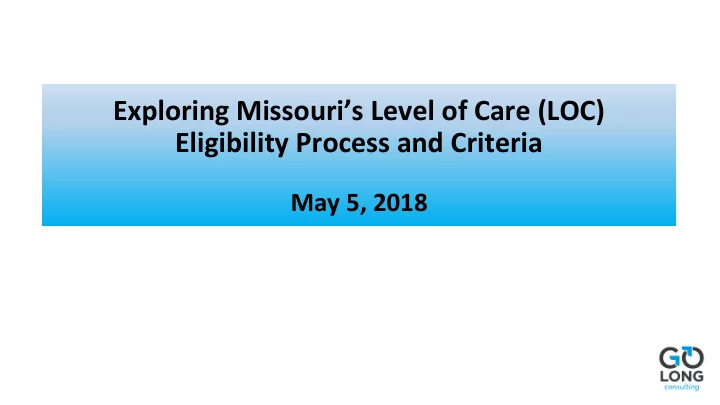

Exploring Missouri’s Level of Care (LOC) Eligibility Process and Criteria May 5, 2018
AcEvity: IdenEfy Challenges • QUESTION – When thinking about the current LOC process and criteria, what are the three to five most significant challenges or issues experienced by the populaFons you serve? • Write one idea per notecard • No less than 3 cards • No more than 5 cards • Please write legibly
Report Out
Missouri’s Need for Technical Assistance • Medicaid under the LTSS program pays 63% of all insFtuFonal care for the state of Missouri • MO spends around 58% towards HCBS • 50% increase in elderly needs in approximately the next 15 years • Host of other concerns like from notecards
Begin with the End in Mind Overarching Goal : Create a new Level of Care (LOC) model that: 1. Ensure access to care for most in need of HCBS providing least restricEve community seYng as long as safely possible 2. Use limited state resources on those most in need of HCBS compared to more costly facility placement. 3. Ensure individuals able to live in the community are not inappropriately placed in a more restricFve seYng.
Technical Assistance (TA) Scope 1. NaFonal landscape scan • Deeper dives into specific states of interest 2. Stakeholder engagement 3. Co-create the new model 4. Summarize key learnings and best pracFces
LOC Refresher • Centers for Medicaid and Medicare (CMS) is single largest payer of health care in the U.S. • LOC mandated by CMS, but states have laFtude what specific eligibility criteria should be • Covers both insFtuFonal care and HCBS
NaEonal Landscape Findings • Conduct a naFonal scan of exisFng LOC research • Evaluate methodology, tools, and processes in all the states • LOC eligibility criteria • FuncFonal assessment types used • Assessors/Determiners of services and supports • Scoring systems • Research strategy • Phone calls, review of statutes/regulaFons, published reports and findings, website scan • Provided a 50-state library of LOC eligibility criteria
Overall Discoveries • Length and depth of findings varied significantly among states • No common nomenclature • Everyone is “unique” • Apprehensive of judgment or oversight • Lack of evidence-based pracFce or research • Eligibility criteria had shared “buckets” with a great degree of variability
What Tools Are Leveraged? • IniFal, Specialized and Cross-CuYng tools • Tools include homegrown tools (LOCET), naFonal assessments (interRAI), or customized tool (ArPath) • interRAI most commonly used tool in U.S. and beyond • Trending upwards, reports of many states exploring/transiFoning • Length and complexity of tool used varied significantly • Paper, electronic/online form, web-based sogware
What are the Criteria Buckets? • Six Shared Buckets 1. ADLs – Commonly includes across all states 2. IADLs – Half of states include 3. Clinical – Two-third of states include 4. Medical – Not medicaFon driven 5. Safety – One quarter use, trending upwards 6. CogniFon – Majority separate mental health, demenFa, IDD
AcEviEes of Daily Living Indicators • Transfers • LocomoFon • Bed mobility • Upper dressing • Lower dressing • EaFng • ToileFng • Personal care • Bathing
Intellectual AcEviEes of Daily Living Indicators • Grocery shopping • TransportaFon • Laundry • Using phone to accomplish tasks • Light housework • Bill paying • Meal preparaFon • Scheduling medical appointments • MedicaFon management • Other shopping tasks • Money management
Clinical Indicators • AssisFve devices • Treatments and procedures • MO uses this label for “rehabilitaFve” below • RehabilitaFve services (long-term needs) • Tube feeding • Wound care • VenFlator care
Medical Indicators • Medical history • Mental health history • Diagnoses • Vital signs • Medical condiFons • Special treatments
Safety Indicators • Environmental factors/problems • Living condiFons • Risk evidence • “But for” factor and impact on LOC
CogniEon Indicators • Behavior • CommunicaFon • Sensory orientaFon • Assessment of social situaFon • Expression
Who Assesses and Who Determines? Assessors include: • Area Agencies on Aging and Disability (AAADs) • Aging and Disability Resource Centers (ADRCs) • Managed Care OrganizaFons (MCOs) • Nursing facility/hospital case managers • State employees • Independent contractors • CerFfied assessors Determiners include: • Physicians • Registered nurses • CerFfied assessors
How Does Someone Meet Eligibility? Four Typical Scoring Systems TYPE OF SYSTEMS • Points Points system Doorway system Algorithm based system Blended system • Doorway 2% 12% • Algorithm-based • Blended 27% 59%
QuesEons on NaEonal Scan?
AcEvity: The Future State If you could wiggle your nose and make it magically happen, what changes would you like to see implemented in the LOC process in Missouri?
Report Out
Bucket Challenge Have thoughts you haven’t shared? Write down your idea or suggesEon for improvement and place it in the appropriate criteria bucket.
Wrap-Up & Next Steps • IdenFfied five states for “deep dives” • Arkansas, Indiana, Louisiana, North Carolina, Wisconsin • “Trusted discovery” • ConFnue stakeholder engagement • Summer meeFngs to explore new LOC models • Co-create new model based on feedback and findings • Project complete by November 2018
An A_er-Thought Contact informaEon charla@golongconsulFng.com melissa@golongconsulFng.com
Recommend
More recommend